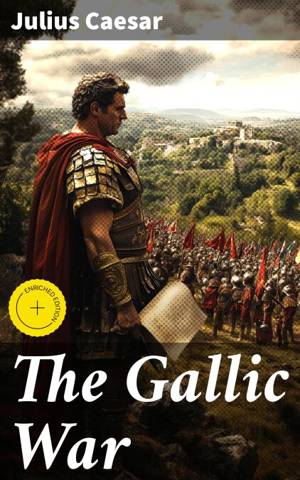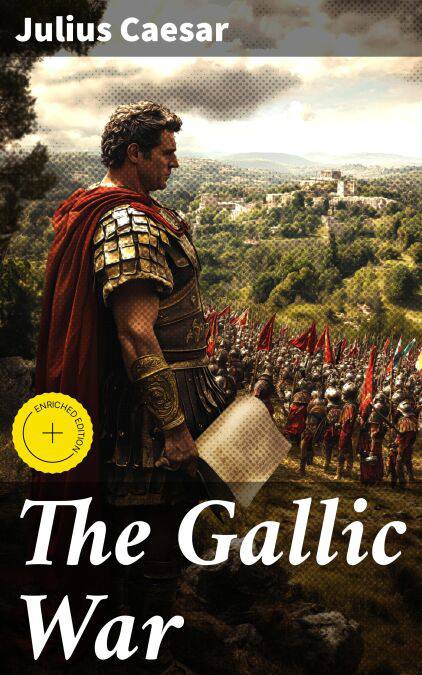
- Afhalen na 1 uur in een winkel met voorraad
- Gratis thuislevering in België vanaf € 30
- Ruim aanbod met 7 miljoen producten
- Afhalen na 1 uur in een winkel met voorraad
- Gratis thuislevering in België vanaf € 30
- Ruim aanbod met 7 miljoen producten
Zoeken
The Gallic War E-BOOK
Enriched edition. Historical Account of Julius Caesar's Military Campaign in Celtic Gaul
Julius Caesar
E-book | Engels
€ 1,99
+ 1 punten
Uitvoering
Omschrijving
In "The Gallic War," Julius Caesar presents a pivotal account of his military campaign against the Gallic tribes from 58 to 50 BCE. Written in a concise, dry, and objective literary style, Caesar's reports are characterized by their clarity, vivid descriptions, and strategic insight, reflecting the conventions of Roman historiography. His first-person narrative offers not only a record of battles and troop movements but also illuminates the complex interactions between the Romans and various tribes, revealing the social and political dynamics of Gaul during a transformative period in Roman history. Julius Caesar, a prominent statesman and military general, composed this work during his time away from Rome, likely to justify his actions and bolster his political standing back home. His dual role as both observer and participant grants unique authority to his narrative. As someone deeply immersed in the intricacies of power, ambition, and governance, Caesar's keen insights into leadership and military strategy emerge as focal themes throughout the text. "The Gallic War" is an essential read for anyone interested in military history, politics, or Roman culture. Caesar's articulate first-hand account not only documents a significant epoch but also serves as a timeless reflection on the nature of power, ambition, and the complexities of leadership.
In this enriched edition, we have carefully created added value for your reading experience:
- A succinct Introduction situates the work's timeless appeal and themes.
- The Synopsis outlines the central plot, highlighting key developments without spoiling critical twists.
- A detailed Historical Context immerses you in the era's events and influences that shaped the writing.
- An Author Biography reveals milestones in the author's life, illuminating the personal insights behind the text.
- A thorough Analysis dissects symbols, motifs, and character arcs to unearth underlying meanings.
- Reflection questions prompt you to engage personally with the work's messages, connecting them to modern life.
- Hand‐picked Memorable Quotes shine a spotlight on moments of literary brilliance.
- Interactive footnotes clarify unusual references, historical allusions, and archaic phrases for an effortless, more informed read.
In this enriched edition, we have carefully created added value for your reading experience:
- A succinct Introduction situates the work's timeless appeal and themes.
- The Synopsis outlines the central plot, highlighting key developments without spoiling critical twists.
- A detailed Historical Context immerses you in the era's events and influences that shaped the writing.
- An Author Biography reveals milestones in the author's life, illuminating the personal insights behind the text.
- A thorough Analysis dissects symbols, motifs, and character arcs to unearth underlying meanings.
- Reflection questions prompt you to engage personally with the work's messages, connecting them to modern life.
- Hand‐picked Memorable Quotes shine a spotlight on moments of literary brilliance.
- Interactive footnotes clarify unusual references, historical allusions, and archaic phrases for an effortless, more informed read.
Specificaties
Betrokkenen
- Auteur(s):
- Vertaler(s):
- Uitgeverij:
Inhoud
- Aantal bladzijden:
- 181
- Taal:
- Engels
Eigenschappen
- Productcode (EAN):
- 8596547670148
- Verschijningsdatum:
- 17/11/2023
- Uitvoering:
- E-book
- Beveiligd met:
- Digital watermarking
- Formaat:
- ePub

Alleen bij Standaard Boekhandel
+ 1 punten op je klantenkaart van Standaard Boekhandel
Beoordelingen
We publiceren alleen reviews die voldoen aan de voorwaarden voor reviews. Bekijk onze voorwaarden voor reviews.








